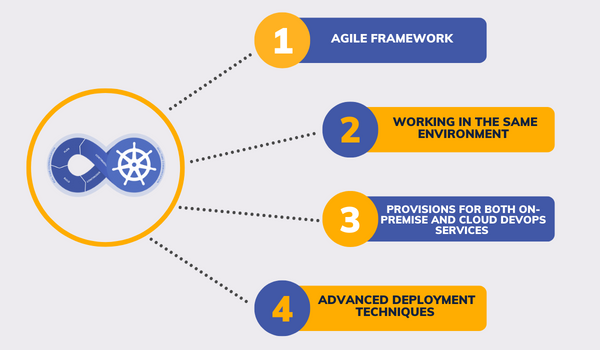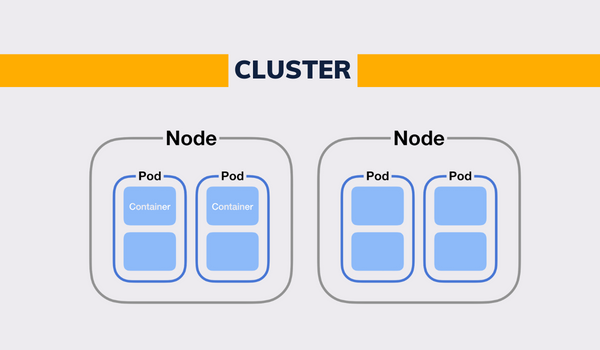Using Kubernetes can improve your business operations drastically. In this post, learn about the details of DevOps Solutions and Services with Kubernetes and its application.
Using Kubernetes in the DevOps toolchain enables distributed orchestration to manage infrastructure and configurations consistently across multiple environments. Automated application deployment and scaling through container management add operational resiliency to the speed of the DevOps pipeline. This benefit is most evident for organizations running multiple platforms, such as on-premises and the public cloud. Deployment methods would differ between these methods without technology like Kubernetes.
Some of the benefits that Kubernetes brings to DevOps Solutions and Services
The use of DevOps solutions comes with a range of advantages that are listed below:

Agile Framework:
An Agile framework is the foundation of most organizations' DevOps delivery cycle. Kubernetes for distributed orchestration is well suited for Agile operations. Kubernetes is a service-oriented architecture and an object-oriented framework that enables it to support Agile principles. DevOps typically covers every phase of the software lifecycle, from planning and building to deployment and monitoring.
Working in the Same Environment
When writing, Testing, or deploying an application inside a container, the atmosphere of the various deliverables does not change. This simplifies collusion between different groups involved in the process, namely developers, testers, and admins. Thus, it allows the team to work in the same environment.
Provisions for Both on-premise and Cloud DevOps Services
Kubernetes allows administrators to deploy applications anywhere without worrying about the underlying infrastructure. This level of abstraction is a big plus for companies that operate containers. A container always runs the same way in Kubernetes. For example, an organization can deploy applications with the same level of control, whether containers run in the cloud that is accessible to remote employees or on on-premises infrastructure.
Advanced Deployment Techniques
Kubernetes also enables advanced deployment techniques such as, Testing in production and rollback release. Developers can rapidly roll out code changes, a key component of any DevOps strategy.
Why Do Companies Use Kubernetes for DevOps Solutions and Services?
One of the main reasons to use Kubernetes for DevOps solutions and services is to reduce your workload. It also resolves conflicts between different environments. This allows engineers to meet customer demands while relying on the cloud for various work apps. It plays a key role in streamlining the development, testing, and delivery pipeline for DevOps managed services. Kubernetes improves the quality of DevOps processes. Here are some reasons why it is:
- Consistency in development, testing, and deployment environments
- Provides seamless updates
- Supports multiple frameworks
- Easy scalability
- Spend less time onboarding new applications
- Improve developer productivity and efficiency
- Helps overcome infrastructure challenges
- Efficient use of servers
Overall, the purpose of using Kubernetes for companies is to improve their overall efficiency and get the products delivered faster.
Glance at Kubernetes

Kubernetes runs containers through pods and nodes.
Pods run one or more than one container. They can run multiple times for scaling and resilience.
Nodes run pods. They are typically grouped into clusters, abstracting physical hardware resources, whether in a dedicated data center or a public cloud.
Kubernetes can run on-premises or in the cloud as a hybrid solution. Running Kubernetes in the cloud helps the remote DevOps teams because it makes collaboration easier.
Kubernetes is an open-source tool. The tool adheres to open-source standards and can be integrated with various toolchains and other services used for DevOps pipelines.
Kubernetes supports Helm charts and reusable Kubernetes packages that describe required resources. Operations specialists can use Helm charts to deploy multiple projects with the same custom application. Without this resource management option, developers would have to customize their software for each environment.
The Future of DevOps Toolchains for Orchestration
DevOps toolchains have long been known as hubs for automation with CI/CD tools, scripted deployments, or a combination of both. But automation is only part of distributed orchestration. The future of DevOps toolchains is clearly hybrid, supporting legacy applications still in the data center, existing applications in the cloud, and newly migrated applications to the cloud.
Make your DevOps toolchain a central orchestration points by combining:
- Kubernetes
- Workflow service automation
- cloud resources
- DevOps practices and automation tools
Combined, these technologies will offer exceptional results for the benefactors of the DevOps solutions and services.
Kubernetes Challenges
Kubernetes offers many advantages, but there are challenges that turn the scenario upside down if not handled properly. Kubernetes is complex and difficult to set up and use. Managing it requires highly skilled resources. For those unfamiliar with containers, especially in Kubernetes, the setup may seem simple and easy to implement and run.
However, in practice, additional features such as maintenance, backups, and disaster recovery are required to be production-ready. Hence, to ensure that the setup is ideal for collaboration and equipped for unforeseen circumstances, you need the assistance of DevOps experts.
Final Thoughts – Kubernetes is A Must-Have for DevOps Solutions and Services
DevOps Solutions and Services that utilize Kubernetes can transform your business. Hence, it is a must-have technology. DevOps Practices are also essential for DevOps Organizations to improve their overall efficiency and effectiveness at work.However, you will need the assistance of experts to help set up the system appropriately.
At MoogleLabs – A DevOps Solutions Company, we offer to create bespoke DevOps solutions for our clients. Contact us to discuss your business needs with MoogleLabs DevOps experts. We will understand your workflow to determine the parts that need adjustment to improve efficiency and create an infrastructure that helps facilitate higher productivity.
